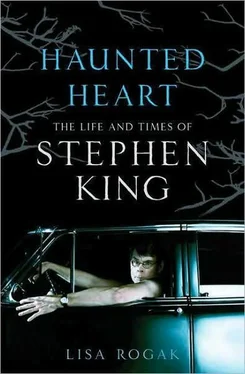He apologized effusively to his teachers, the principal, his mother, and to the students who’d plunked down a quarter to read his writing. He wanted everyone to like him, and Ruth thought that his desire to please was hardwired into his system. One of his mother’s favorite lines was “Stevie, if you were a girl, you’d always be pregnant.”
But in Steve’s mind, he wanted to please his mother in particular because he knew how hard her life was. They ate a lot of lobster while Steve was growing up—back then it was considered to be poor man’s food. A family would often keep a pot of stew on the stove for several days, reheating it when necessary and adding more lobster meat, potatoes, onions, and carrots when the pot ran low. Though it provided necessary sustenance, many families were embarrassed at having to rely on it.
“If the minister visited, she took it off the stove and put it behind the door, as if he wouldn’t be able to smell it,” said Steve, “but the smell was all through the house and got in your clothes, your hair.”
Nineteen-sixty marked a huge leap into the modern world for Steve as he moved from the one-room schoolhouse to a new building where nothing was a hand-me-down, from the desks and chairs to the books. Durham Elementary was for grades one through eight and opened to much fanfare in a town that had previously had two run-down one-room schoolhouses. Steve joined its first class of seventh graders.
On the first day of school, the kids were most excited about having flush toilets and running water indoors. For many students, it was the first time they rode a bus to school.
Lew Purinton first met Steve in the seventh grade when Durham Elementary opened. Since they lived on opposite ends of town, they had attended different one-room schools.
Steve was hard to miss. “He was the biggest kid in the class,” said Purinton. “I remember seeing him walking down the aisle between the desks, and I asked him how old he was, since he looked so much bigger than the rest of us. He looked down at me and said, ‘I’m old enough to know better, but I’m too young to care.’ ”
With that acerbic remark, Purinton knew he had a new friend. They were in the same class of twenty-five students, and soon they began to hang out outside of school.
Purinton visited Steve at his house, which he remembers was an old farmhouse much different from his own home. “It was obvious that they didn’t have money, that they were struggling,” he said. “The house wasn’t neat and clean.”
However, the thing that stood out in his mind was Steve’s tiny bedroom, where literally hundreds of paperback books were stacked around the edges of the room and even at the end of Steve’s bed, with no bookshelf in sight. Most of the books were science fiction and horror.
When Lew asked his friend about them, Steve said he’d read every one of them. Scattered through the piles of books were numerous volumes by H. P. Lovecraft, a horror writer from the early twentieth century widely considered to be the genre’s successor to Edgar Allan Poe.
Steve was thirteen when he first discovered Lovecraft, which he later maintained was an ideal age to start reading his work. “Lovecraft is the perfect fiction for people who are living in a state of sort of total sexual doubt, because the stories almost seem to me sort of Jungian in their imagery,” he later said. “They’re all about gigantic disembodied vaginas and things that have teeth.”
With Lovecraft and his other favorite authors around, Steve viewed his room as a sanctuary away from the pressures of school and the need to fit in as an unathletic kid with bad eyes and little coordination and no success with girls. He wasn’t popular, yet he wasn’t totally stigmatized such as two girls who lived in his neighborhood.
One was a girl whose mother entered every single sweepstakes and contest that came down the pike. She won prizes regularly, but they tended toward the unusual: enough pencils or tuna fish to last for a year. The most expensive and prestigious prize she won was Jack Benny’s old Maxwell car, though she never drove it and let it sit beside the house to slowly rust and rot into the ground.
Even though she had enough money to buy postage stamps to enter all the contests and sweepstakes, she apparently had little left over for her kids. The children were given one set of clothes that had to last from September through June. Obviously, they were an easy target of ridicule for the other kids.
Sophomore year, the girl broke ranks and wore a completely different outfit after returning from Christmas vacation. Her usual outfit—black skirt, white blouse—was swapped out for a woolen sweater and a skirt that was in style. She’d even permed her hair. “But everybody made more fun of her because nobody wanted to see her change the mold,” said Steve.
He had taken to doing odd jobs for neighbors. A couple of times, he was hired to dig a grave at the local cemetery. His friend Brian Hall’s father oversaw the graveyard and hired the boys to do the job, which paid twenty-five bucks, a fortune to a teenage boy in the early sixties.
Another time, he was hired by the mother of the other outcast girl, who tried to make herself as small as possible whenever she had to walk down the halls of high school. The family lived in a trailer near Steve’s house in West Durham. When Steve went into the trailer to do an odd job for the mother, he was dumbfounded by the enormous crucifix that towered over the living room. The Jesus figure was particularly realistic, with blood dripping from the hands and feet and an anguished look on his face.
The girl’s mother told Steve that Jesus was her personal savior, then asked him if he’d been saved. He said he hadn’t and left the house as quickly as possible.
When he started to write Carrie, the memory of these two outcasts inspired his portrayal of the main character. He later discovered that both girls had died by the time he began writing the story; the girl with one outfit for the entire year shot herself in the stomach shortly after giving birth to a child, while the other, an epileptic, had moved out of the trailer after graduating from Lisbon High, but had suffered a seizure in her apartment and died alone.
From the time he was ten years old, though Steve loved to play sports, he wasn’t athletic. At his new school, the students spent recess and lunchtime out on the playground playing games.
Baseball was a popular choice for these informal recreation times, and Steve loved to play baseball, but when it came time to pick sides, he was inevitably one of the last kids picked.
However, he was actively recruited for football because of his size. “I had to play football, because if you were big and didn’t play football, that meant you were a fucking faggot,” he said. “All I was good for in football was left tackle.” Though he had a few good friends he hung out with, that didn’t stop him from feeling different from the other kids at school.
He was also unofficially banned from joining the Boy Scouts since he didn’t have a father to help the boys out.
If Steve was bothered by being excluded—first the ball field, then Boy Scouts—he didn’t show it. One day in the fall of 1960, he’d made an important discovery in the attic above his Aunt Ethelyn and Uncle Oren’s garage. The musty space had long been a catchall for old stuff that various family members no longer had any immediate use for but, being frugal Mainers, wouldn’t throw away. After all, you never knew when somebody might be able to put something to good use.
The children in the family—including Steve and his brother, David—were discouraged from going into the attic. The wooden planks of the floor had never permanently been attached to the beams, and in a few places there were gaps.
Читать дальше












